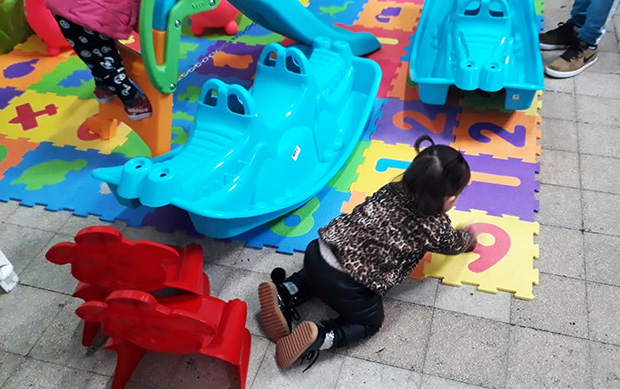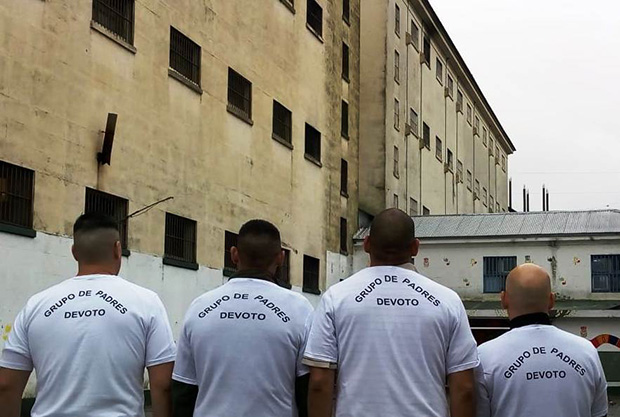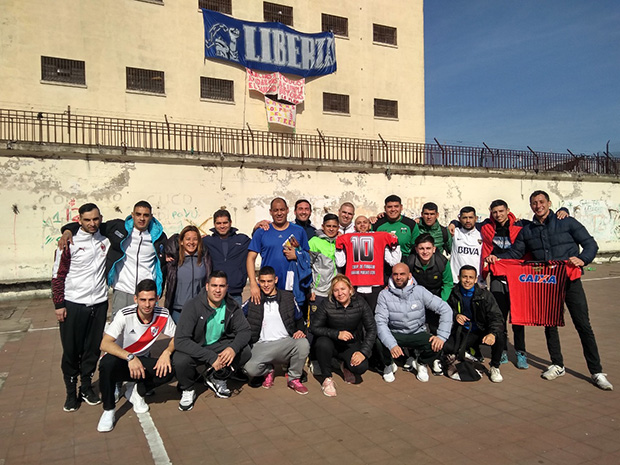“This has never happened before. It is truly historic, and it is all thanks to the documentary you guys did.”
-Daniel, a coordinator of Grupo de Padres de Devoto
A couple of years ago, our team at CWS produced a documentary alongside our partner ACiFaD in Argentina. It was called Desinvisibilizar (“making the invisible visible”) and addressed the toll that having a parent in prison can take on children. When we decided to produce this documentary, we hoped it would help us open doors to government offices, partner organizations, decision makers and potential donors.
But we never thought it would open the doors of a prison and kick off a process like this.
Devoto is the only remaining federal prison in Buenos Aires. When Desinvisibilizar came out, the university center that functions inside the prison hosted a screening. Then CWS and ACiFaD led a series of workshops and conversations where prisoners had the chance to talk about the challenges of being a father–and a son–behind bars.
Grupo de Padres de Devoto (“Group of Fathers from Devoto”) was born. It’s an association made up of 14 fathers who are prisoners in Devoto. “Those meetings were very moving for us. We talked about things that we usually don’t talk about inside the prison. It was emotional for all of us, but it was also encouraging. There is where this idea was born,” says one of group’s coordinators. “Hearing what Lucas, Nicole, Brian and all of you said in the documentary made us realize we needed to do something,” says another of the coordinators, Iván.
The fathers wanted to help their children have a more pleasant time when they visit the prison. So, in early 2019, the 1,500+ Devoto prisoners presented a letter to the authorities. One of their requests was for friendlier spaces that they could use when their families visited. They also asked for better living conditions and higher quality food, among other things. The authorities agreed, and approved their request. But there weren’t funds available to buy playground equipment, so the prisoners would have to fund it themselves.
That’s exactly what they did.
Last week, the Grupo hosted the In Solidarity Football Tournament. Prisoners from different modules of the prison formed teams and competed in the fundraiser. “We decided to organize the tournament mostly to raise awareness about the issue and to let everyone know why we were doing that,” one coordinator said. “There were no fights, no arguments. Everyone understood that there was another objective besides winning–to collect money to but the playgrounds for our kids.”
Prisoners heard what was happening. They told their families and others outside the prison walls, and the fundraising began. Most of the funds came from the prisoners themselves and their families. But their neighbors chipped in to help. So did colleagues from the University Center and other private donors who heard about what was happening. Butchers donated lunches, football clubs donated tournament equipment and CWS donated stationary for flyers and hired professional referees. The players received videos and greetings from celebrities, journalists and professional football players that helped create awareness about the tournament and the issue. A local organization called 26 de Septiembre, which is led by the cousin of one of the prisoners, coordinated the campaign on a volunteer basis.
They got support from people who they never thought could support something like this, they told me. The prison authorities were also very supportive and were great to work with.

A child plays in one of the new playground spaces at the prison. Photo courtesy Grupo de Padres de Devoto.
For the first time in the prison’s 93-year history, it has playgrounds. Five are under construction in different parts of the prison, and the Grupo has more plans. As Daniel, one of the coordinators from the Grupo said, “We are tired but very happy about what we achieved and we want to do more. Now our objective is to build a playground for our older children and also to paint murals in all the visit areas. We thank ACiFaD, CWS and everyone who has supported us so far. It is a dream come true and the most important thing is that it is not for us, it is for our children.”
When we were producing that documentary, I would never have guessed that it would lead us here. The beautiful thing about this initiative is that the fathers themselves pulled it off. We helped as much as we could, but the fathers were the ones who made it happened and got the play equipment for their children. And in the process, they accomplished exactly what the documentary was named to do: make an invisible issue visible.
Luciano Cadoni is the Program Officer for the Protection of the Rights of the Child with CWS in Latin America and the Caribbean.


